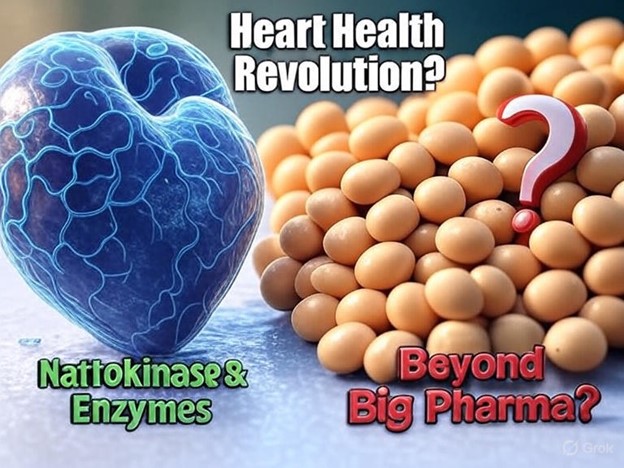
“Nattokinase reverses heart disease—but only if you take enough. A landmark clinical study with over 1,000 participants reveals the dose-dependent power of Nattokinase to shrink arterial plaque, improve lipid profiles, and do it all without side effects,” according to Sayer Ji.
Nattokinase (NK) is a fibrinolytic serine protease enzyme derived from fermented soybeans (natto). Long valued in traditional Japanese medicine, Nattokinase has gained attention for its potential cardiovascular benefits, particularly in managing blood clotting, plaque buildup, and reducing blood pressure, as well as related risk factors. Other enzymes, such as serrapeptase, lumbrokinase, and bromelain, share similar properties and are often studied or used alongside Nattokinase for cardiovascular health.
The Study: Real-World Evidence in 1,062 Participants
Published in Frontiers in Cardiovascular Medicine, a large-scale clinical study (1,062 participants) evaluated the effects of nattokinase on atherosclerosis progression and hyperlipidemia over 12 months. Participants took either 10,800 FU (fibrinolytic units) or 3,600 FU per day.
The findings were nothing short of remarkable:
- At 10,800 FU/day, NK led to a significant reduction in the thickness of the carotid artery intima-media and the size of carotid plaques.
- Plaque regression rates ranged from 66.5% to 95.4% depending on individual factors.
- No adverse effects were reported at this high dose.
Conversely, participants taking 3,600 FU/day saw no significant improvement—clearly indicating that the commonly recommended dose may be too low to be effective. This research strikes at the heart of cardiovascular disease mortality. Unlike statin drugs, which aim to suppress LDL levels without addressing arterial integrity or clot risk, nattokinase directly targets the fibrin matrix and plaque structures responsible for occlusion. It represents a root-cause approach—something sorely missing in modern pharmaceutical paradigms.
Proven Cardiovascular Benefits of Nattokinase
A 2018 review highlighted nattokinase’s remarkable multi-pronged cardiovascular effects, backed by both human and animal studies:
- Fibrinolytic/Antithrombotic: Directly degrades fibrin; increases tissue plasminogen activator (tPA); mimics natural clot-dissolver plasmin.
- Antiatherosclerotic & Lipid-Lowering: Reduces LDL, triglycerides, and plaque formation; mitigates oxidative damage.
- Antihypertensive: Lowers blood pressure in both animal models and clinical settings.
- Anti-platelet/Anticoagulant: Thins the blood, further supporting circulation.
- Neuroprotective: May help reduce ischemic injury and support cognitive function.
Stacking Synergy: K2 and Aspirin Boost NK’s Power
Researchers also observed that co-administering vitamin K2 and low-dose aspirin (81 mg) with nattokinase produced a synergistic effect—further improving cardiovascular outcomes. This makes biological sense: K2 helps direct calcium away from arteries and into bones, while aspirin’s anti-inflammatory effects may enhance the clot-busting potential of NK cells. However, I would choose high-dose magnesium supplementation over aspirin any day.
Subjects who exercised regularly, avoided smoking, and limited alcohol intake also saw greater benefits, suggesting that lifestyle optimization amplifies nattokinase’s therapeutic potential.
Nattokinase (NK), has been shown to have antiatherosclerotic and lipid-lowering effects. The most active ingredient in natto, with an alkaline protease of 275 amino acid residues, molecular weight approximately 28 kDa, was first discovered by Sumi et al. in 1987. The effects of NK include antihypertensive, antiatherosclerotic, lipid-lowering, anti-platelet, and neuroprotective effects. Natto consumption is believed to be a significant contributor to the longevity of the Japanese population, and a high intake of natto is associated with a decreased risk of total cardiovascular disease mortality. NK, as a health supplement, has been distributed throughout the world and has gained popularity among people who want to prevent cardiovascular disease actively.
Other Cardiovascular Enzymes to Explore
Beyond nattokinase, nature offers several similar proteolytic enzymes beneficial for circulation:
- Lumbrokinase (from earthworms): Often compared to nattokinase; may have even stronger fibrinolytic activity.
- Serrapeptase (from silkworm-derived Serratia bacteria): Known for reducing inflammation and helping clear degraded tissue.
- Plant Proteases: Bromelain (pineapple) and papain (papaya) offer anti-inflammatory and fibrinolytic actions—supportive, though less potent.
Summary Table
|
Enzyme |
Source |
Key Cardiovascular Effects |
|
Nattokinase |
Fermented soy (natto) |
Fibrinolytic, antihypertensive, lipid-lowering, neuroprotective |
|
Lumbrokinase |
Earthworm |
Strong fibrinolytic activity |
|
Serrapeptase |
Silkworm bacteria |
Anti-inflammatory, tissue-clearing |
|
Bromelain/Papain |
Pineapple/Papaya |
Mild fibrinolytic, anti-inflammatory effects |
Conclusion
Nattokinase stands out as a natural, multi-functional support for cardiovascular health—promoting clot breakdown, improving blood flow, and lowering key risk factors. Lumbrokinase and serrapeptase also offer compelling benefits, especially for inflammation and circulation. As always, careful dosing is essential.
Dr.Sircus is a reader-supported publication. To receive new posts and support my work, consider becoming a free or paid subscriber.
Subscribe now



comments